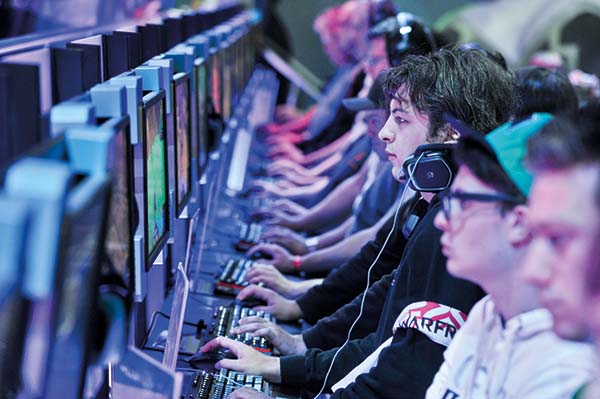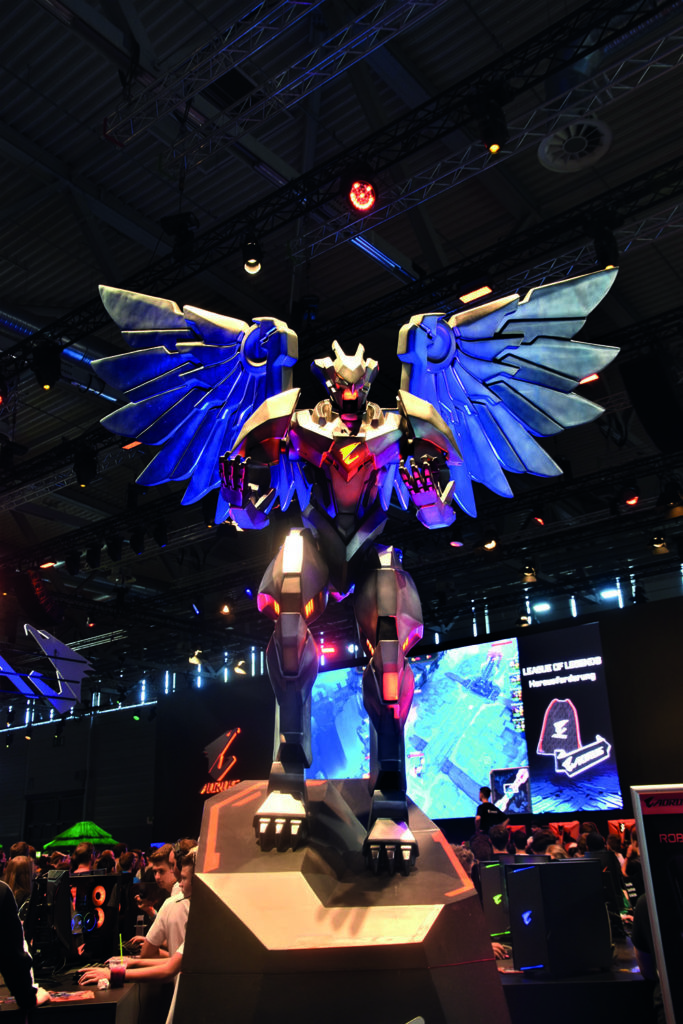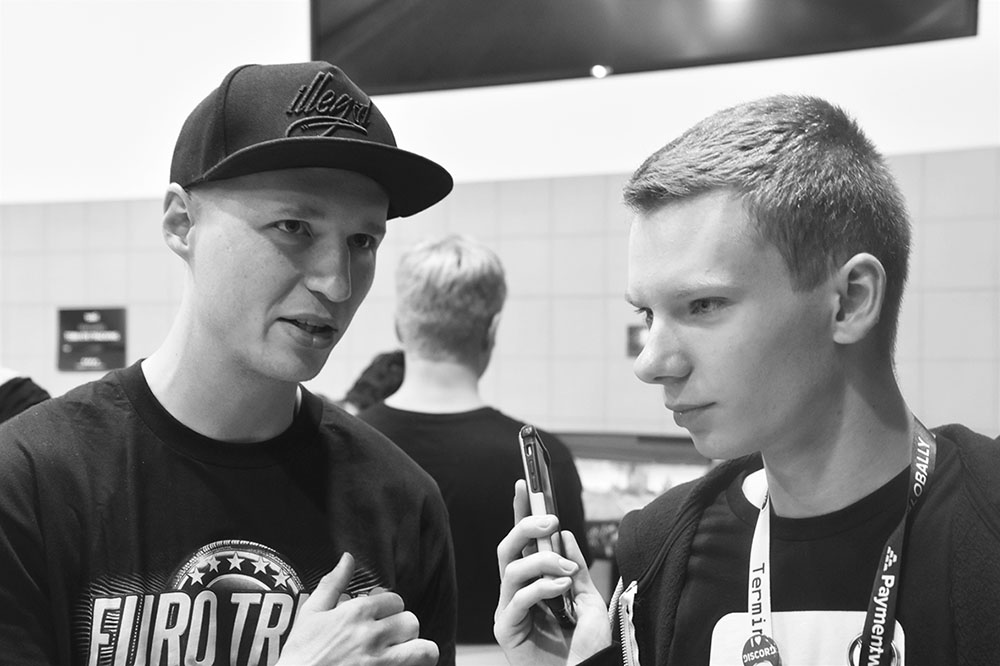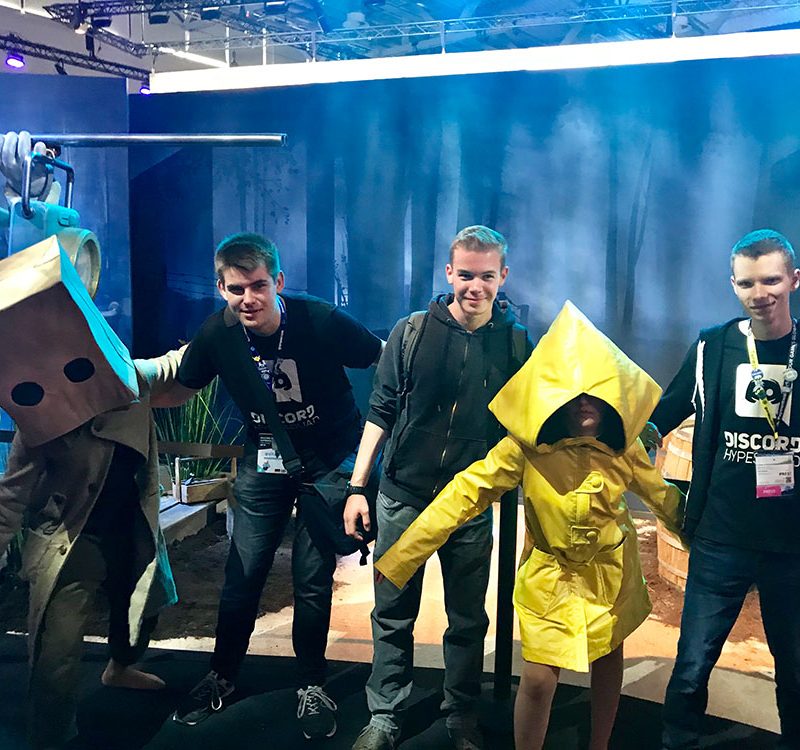
Videospiele und Bildung? Auf den ersten Blick passt das gar nicht zusammen. Es gibt sie aber immer mehr, die ernsthaften Computerspiele, die Bildungsinhalte spielerisch vermitteln sollen: die sogenannten Serious Games.
Noch haben Lehrer und Schüler wenig Erfahrung mit Computerspielen im Unterricht. Angesichts der Digitalisierung unserer Arbeitswelt stellt sich jedoch die Frage, ob künftig Serious Games als Lernmethode in die Lehrpläne der Schulen aufgenommen werden sollten.
Serious Games und Game-Based Learning wurden in den Anfängen von „echten“ Gamern eher als Nebenprodukt belächelt. Heute sind sie in vielen Bereichen und Branchen unverzichtbar geworden. So sind sie die optimalen Trainingspartner und Testgelände z.B. für Piloten, Mediziner und Schwertransportfahrer, die sich in aufwändigen 3D-Simulationen für die Praxis fit machen. Aber auch zur Wissensvermittlung in Form von Strategiespielen werden Serious Games eingesetzt, um weltpolitische Zusammenhänge verständlich zu machen. Selbst Fremdsprachen lernen Schüler mit digitalen Programmen auf spielerische Weise.
Serious Games nutzen die menschliche Neugierde, um unterhaltsam und effizient verschiedenste Inhalte dem Lernenden nahezubringen – von wissenschaftlichen und geschichtlichen Zusammenhängen über soziale und fachliche Kompetenzen bis hin zur Bedienung komplexer Maschinen.
Serious Games werden daher immer mehr in Unternehmen als sogenannte „Corporate Games“ eingesetzt, um Mitarbeiter im Umgang mit Industrieanwendungen zu schulen. Einsatzmöglichkeiten findet man bereits bei Maschinenherstellern, in der Medizintechnik, der Autoindustrie und der Luftfahrtbranche bis hin zum Rüstungssektor. Auch bei Einstellungsverfahren und Vertriebsschulungen kommen Serious Games schon zum Einsatz.

Serious Games as knowledge transfer. Video games and education?
At first glance, they don’t seem to go together at all. But there are more and more of them, the serious computer games that are supposed to convey educational content playfully: the so-called Serious Games.
Teachers and students still have little experience with computer games in class. In light of the digitalization of the working world, however, the question arises as to whether Serious Games should be included in school curricula as a learning method in the future.
In the early days, Serious Games and game-based learning were looked down upon by „real“ gamers rather as a by-product of the gaming industry. Today they have become indispensable in many areas and industries. This makes them the ideal training partners and test sites for pilots, doctors and heavy transport drivers, for example, who get fit for the real world in elaborate 3D simulations. Serious Games are also used to impart knowledge in the form of strategy games to make global political contexts understandable. Even foreign languages are learned playfully with digital programmes.
Serious Games use human curiosity to bring a wide variety of content to the learner entertainingly and efficiently – from scientific and historical contexts over social and technical skills to the operation of complex machines.
Serious Games are therefore increasingly used in companies as so-called „corporate games“ to train employees in the use of industrial applications. Applications can already be found with machine manufacturers, in medical technology, the automotive industry, the aviation industry and even the armaments sector. Serious Games are also already being used for recruitment and sales training.
Wie Serious Games funktionieren.
Den Serious Games sieht man den didaktischen Aspekt für den Spieler nicht sofort an. Der Lernprozess soll das unterhaltsame Spielerlebnis eher unterschwellig begleiten. Realitätsnahe und alltägliche Situationen, in denen der Spieler Konflikte oder Fragestellungen lösen muss, die sich unmittelbar aus einer fiktiven Handlung ergeben, werden spielerisch aufgegriffen. Zudem fordert das Spiel den Anwender auf, sich mit komplexen Vorgängen und Verfahren z.B. aus der Berufswelt vertraut zu machen. Der Nutzer lernt dabei aktiv, Zusammenhänge und Prozesse zu verstehen, indem er Informationen nicht nur theoretisch aufnimmt, sondern sich im Spiel mit ihnen beschäftigt.
Anders als die bislang bekannten E-Learning-Tools setzen Serious Games didaktische Erkenntnisse aus der Entwicklung von Computerspielen in die Methodik mit ein, um Lerninhalte unterhaltsam, zielgerichtet und nutzerfreundlich zu vermitteln. Der „Spieltrieb“ und der sportliche Aspekt motivieren den Lernenden intrinsisch und begeistern ihn nachhaltig für den Lernstoff.
Herausforderungen mit individuellen Schwierigkeitsstufen sorgen dafür, dass weder Unter- noch Überforderung demotivierend wirken. Durch regelmäßige Erfolgserlebnisse wird das Verlangen gesteigert, die Lernumgebung immer weiter zu erkunden. Indem er sich Wissen im Spiel aneignet und es beim Lösen weiterer Aufgaben einsetzt, taucht der Anwender tiefer in die Spielewelt ein und erlebt den aus der Lernpsychologie bekannten „Flow“.
Da Serious Games alle Sinne in den Lernprozess mit einbeziehen, erlebt der Anwender eine angenehme Lernatmosphäre. Er kann ausprobieren, forschen, herumexperimentieren und bei allem bleiben Fehler ungestraft. Der Lernende ist motiviert und dies regt seine Neugier an. So können Zusammenhänge besser verstanden und neue Erkenntnisse in weiteren Aufgabenstellungen des Spiels praktisch angewendet und eingeübt werden.
How serious games work.
The didactic aspect of Serious Games is not immediately apparent to the player. The learning process is supposed to accompany the entertaining game experience rather subliminally. Realistic and everyday situations in which the player has to solve conflicts or questions that arise directly from a fictional plot are taken up playfully. The game also challenges the user to become familiar with complex processes and procedures, for example, those from the professional world. The user actively learns to understand interrelationships and processes by absorbing information not only theoretically, but also by interacting with them through play.
Unlike the e-learning tools known to date, Serious Games incorporate didactic findings from the development of computer games into the methodology to convey learning content in an entertaining, targeted and user-friendly manner. The „play drive“ and sportive aspect intrinsically motivate the learner and inspire him/her for the learning material in a sustainable way.
Challenges with individual levels of difficulty ensure that neither too low nor too high demands have a demotivating effect. Regular experiences of success increase the desire to explore the learning environment further and further. By acquiring knowledge in the game and using it to solve further tasks, the user delves deeper into the game world and experiences the „flow“ known from learning psychology.
Since Serious Games involve all senses in the learning process, the user experiences a pleasant learning atmosphere. They can try things out, do research, experiment and, for all that, make mistakes unpunished. The learner is motivated and this stimulates his curiosity. In this way, correlations can be better understood and new insights can be practically applied and practised in further tasks of the game.
Source: www.seriousgames.net
Das Interview

Daniel Němec, Community Manager der Tschechischen Firma SCS Software, die auf Simulatorspiele spezialisiert ist, im Gespräch mit Tom Andrew:
So, could you tell us a little bit about your game?
Okay, so SCS Software produce, develop and distribute two games: American Truck Simulator and Euro Truck Simulator 2 – both are based on trucking simulations. In these games you are a professional truck driver, but you start with no trucks. Then as you progress through the game you can earn enough in-game experience and in-game money to buy your own first truck or start your own logistics company. Furthermore, you can hire new virtual drivers for your company, buy new trucks to build your fleet and also customize your trucks. There are also hundreds of cargoes you can haul. Our games are well- known for being relaxing games, they say it’s almost like a zen experience. A lot of players play our game just to relax or to drive and explore Europe and its countries, because everything in our games is based on real references. It’s scaled down a little bit because we don’t want to force our players to drive from Paris to Rome for 16 straight hours, you know? So it’s a bit smaller, but it’s all based on real life, so that people that live there can recognise their homeland and so on… (there is only so much I can tell you about our games to describe them well but I guess that we don’t want this first question to be 30 minutes long so… if you want to know more just google Euro Truck Simulator 2 or American Truck Simulator and then you will find everything else…)
All right, how do you think your Company has an effect on the youth of today?
Well, I think that our company and the games that we produce can teach the youth how to act on the roads, the basics of the traffic rules and how to drive or how to approach certain situations on the road. I think they can even learn some management, like when you need to deliver something in time and then deciding when to take breaks (to deliver the cargo on time) or just choosing which cargo to deliver next. So yes, I think that our games have a positive effect on the youth and I think they help grow new professional truck drivers… or at least we hope so (haha…) because you know the industry is suffering from a lack of professional truck drivers so we hope that our games help grow future truck drivers.
We also have stories that people are sending us who use our games to teach the basics of driving a truck in driving schools, or people that fell in love with trucks so much that they quit their previous job and became professional truck drivers because of our games. These stories are really, really amazing!
Definitely! Well, what makes your games so attractive to people?
Well, I think it is the level of detail, the fact that everything is based on real scenery, and what I think is the main part is that we still develop our games. We don’t just do one title and then move on to a different game, we still expand our games with new features, new roads, new trucks, new trailers and we really care about the community, so that’s why we try to give them something new to play with all the time.
Yeah! So how do you go about selling your product?
I think this question is more for our CEO, but I know that we do a lot of modern marketing through social media, through digital marketing like teasers and trailers and advertising for new DLCs and building the Hype when the DLC is about to release.
Right, well, why do you come to gamescom?
Because it’s the biggest gaming convention in Europe! But also, because here in Germany our games are really popular and a big part of our community is from Germany as well. People always say that Germany is the holy ground for simulator games because the people here really love them. Gamescom is the biggest event on our list every year. If you want to be a big player in the gaming industry then you have to be at gamescom!
Very true. So, last question. What do you enjoy most about being here?
What do I enjoy most about being here? I mean… it’s the atmosphere, nowhere else other than gamescom can you meet all the wonderful people who just love games and they’re all in a good mood, they don’t want to fight or argue, they’re all just relaxed here. And nobody is faking anything, nobody thinks that they are better than somebody else. Everyone here is a gamer, and gamers are the best people.
I have to agree! Thank you very much for the interview!

Es ist die größte Spielemesse weltweit, mit über 1.100 Ausstellern auf einer Fläche von 218.000 Quadratmetern: die gamescom.
Seit der ersten gamescom im Jahr 2009 steigen die Besucherzahlen jährlich an. Was Aussteller und Besucher zur gamescom zieht, haben Tom Andrew und Daniel Purrio für den Standpunkt auf der gamescom2019 in Interviews mit Vertretern der Cherry GmbH, Corsair, Charles Games und SCS Software recherchiert.
Neben der Ausstellung von Spielen und Konsolen wird das Thema Digitalisierung für Firmen immer relevanter. Das zeigt sich unter anderem auch in der Präsenz von Informationsständen zu Beruf und Karrieremöglichkeiten in der Branche.
So bildet die bayrische Firma Cherry GmbH, die insbesondere durch „Cherry MX“ Tastaturschalter bekannt ist, sowohl im kaufmännischen Bereich als auch in der Produktionstechnik aus. Diese Schalter werden unter anderem von der Firma Corsair in ihren Tastaturen verbaut.
Die Produktpalette der 1994 gegründeten amerikanischen Firma Corsair umfasst diverse Bauteile von Computern, Kopfhörern und PC-Zubehör sowie Wasser-Kühlvorrichtungen.
Mit Charles Games und SCS Software konnten die Standpunktredakteure mit zwei Softwareentwicklern über ihre Spiele sprechen.
Charles Games präsentierte „Svoboda 1945“, den Nachfolger ihres preisgekrönten Spiels „Attentat 1942“, als Neuerscheinung auf der diesjährigen Messe. Vorlage und Thema des Spielkonzept von „Svoboda 1945“ sind die Ereignisse nach dem Rückzug der Nationalsozialisten aus der Tschechoslowakei am Ende des Zweiten Weltkriegs, die Vertreibung der Sudetendeutschen und der Aufstieg der Kommunisten zur Macht. Als pädagogisch wertvoll bezeichnet Charles Games ihr Videospiel, weil es ein Beitrag zur historischen Wissensvermittlung über das Medium Videospiel ist. Ihrer Ansicht nach ermöglicht „Svoboda 1945“ den Spielern Geschichte auf einer interaktiven Weise zu erfahren. Das Spiel erschien Anfang 2020.

It is the largest games fair in the world, with over 1,100 exhibitors on an area of 218,000 square meters: Gamescom.
Since the first Gamescom in 2009, the number of visitors has risen every year. Tom Andrew and Daniel Purrio have researched what attracts exhibitors and visitors to gamescom2019 in interviews with representatives of Cherry GmbH, Corsair, Charles Games and SCS Software.
In addition to the exhibition of games and consoles, the topic of digitisation is becoming increasingly relevant for companies. This can be seen, among other things, in the presence of informative stands on professions and career opportunities in the industry.
For example, the Bavarian company Cherry GmbH, known in particular for its „Cherry MX“ keyboard switches, provides apprenticeships both in the commercial sector and in production engineering. These switches are used by the company Corsair in their keyboards, among others.
The product range of the American company Corsair, founded in 1994, includes various components of computers, headphones and PC accessories such as water-cooling devices.
With Charles Games and SCS Software, the Standpunkt editors were able to talk to two software developers about their games.
Charles Games presented „Svoboda 1945“, the successor to their award-winning game „Attentat 1942“, as a new release at this year’s fair. The template and theme of the game concept of „Svoboda 1945“ are the events after the withdrawal of the National Socialists from Czechoslovakia at the end of World War II, the expulsion of the Sudeten Germans and the rise of the Communists to power. Charles Games describes their video game as pedagogically valuable because it is a contribution to historical knowledge through video games. In their opinion, „Svoboda 1945“ allows players to experience history interactively. The game was released in early 2020.


